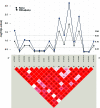Variants in blood pressure genes and the risk of renal cell carcinoma
- PMID: 20047954
- PMCID: PMC2847086
- DOI: 10.1093/carcin/bgp321
Variants in blood pressure genes and the risk of renal cell carcinoma
Abstract
Hypertension is a known risk factor for renal cell carcinoma (RCC), although the underlying biological mechanisms of its action are unknown. To clarify the role of hypertension in RCC, we examined the risk of RCC in relation to 142 single-nucleotide polymorphisms (SNPs) in eight genes having a role in blood pressure control. We analyzed 777 incident and histologically confirmed RCC cases and 1035 controls who completed an in-person interview as part of a multi-center, hospital-based case-control study in Central Europe. Genotyping was conducted with an Illumina GoldenGate Oligo Pool All assay using germ line DNA. Of the eight genes examined, AGT (angiotensinogen) was most strongly associated with RCC (minimum P-value permutation test = 0.02). Of the 17 AGT tagging SNPs considered, associations were strongest for rs1326889 [odds ratio (OR) = 1.35, 95% confidence interval (CI) = 1.15-1.58] and rs2493137 (OR = 1.31, 95% CI = 1.12-1.54), which are located in the promoter. Stratified analysis revealed that the effects of the AGT SNPs were statistically significant in participants with hypertension or high body mass index (BMI) (> or =25 kg/m(2)), but not in subjects without hypertension and with a normal BMI (<25 kg/m(2)). Also, haplotypes with risk-conferring alleles of markers located in the promoter and intron 1 regions of AGT were significantly associated with RCC compared with the common haplotype in subjects with hypertension or high BMI (global P = 0.003). Our findings suggest that common genetic variants of AGT, particularly those in the promoter, increase RCC risk among subjects who are hypertensive or overweight.
Figures
Similar articles
-
Polymorphisms in genes of the renin-angiotensin-aldosterone system and renal cell cancer risk: interplay with hypertension and intakes of sodium, potassium and fluid.Int J Cancer. 2015 Mar 1;136(5):1104-16. doi: 10.1002/ijc.29060. Epub 2014 Jul 10. Int J Cancer. 2015. PMID: 24978482
-
Genotype-phenotype analysis of angiotensinogen polymorphisms and essential hypertension: the importance of haplotypes.J Hypertens. 2010 Jan;28(1):65-75. doi: 10.1097/HJH.0b013e328332031a. J Hypertens. 2010. PMID: 19770777 Free PMC article.
-
Haplotype association analysis of AGT variants with hypertension-related traits: the HyperGEN study.Hum Hered. 2005;60(3):164-76. doi: 10.1159/000090118. Epub 2005 Dec 12. Hum Hered. 2005. PMID: 16352906
-
[Role of the angiotensinogen gene for essential hypertension].Herz. 2000 Feb;25(1):15-25. doi: 10.1007/BF03044120. Herz. 2000. PMID: 10713906 Review. German.
-
A haplotype of the angiotensinogen gene is associated with hypertension in african americans.Clin Exp Pharmacol Physiol. 2005 May-Jun;32(5-6):495-502. doi: 10.1111/j.1440-1681.2005.04217.x. Clin Exp Pharmacol Physiol. 2005. PMID: 15854165 Review.
Cited by
-
Contribution of Endothelial Dysfunction to Cancer Susceptibility and Progression: A Comprehensive Narrative Review on the Genetic Risk Component.Curr Issues Mol Biol. 2024 May 16;46(5):4845-4873. doi: 10.3390/cimb46050292. Curr Issues Mol Biol. 2024. PMID: 38785560 Free PMC article. Review.
-
Cardiovascular, diabetes, and cancer strips: evidences, mechanisms, and classifications.J Thorac Dis. 2014 Sep;6(9):1319-28. doi: 10.3978/j.issn.2072-1439.2014.07.15. J Thorac Dis. 2014. PMID: 25276377 Free PMC article. Review.
-
Oxidative DNA damage in kidneys and heart of hypertensive mice is prevented by blocking angiotensin II and aldosterone receptors.PLoS One. 2014 Dec 31;9(12):e115715. doi: 10.1371/journal.pone.0115715. eCollection 2014. PLoS One. 2014. PMID: 25551569 Free PMC article.
-
Renin angiotensin system deregulation as renal cancer risk factor.Oncol Lett. 2017 Nov;14(5):5059-5068. doi: 10.3892/ol.2017.6826. Epub 2017 Aug 25. Oncol Lett. 2017. PMID: 29098020 Free PMC article.
-
Renin angiotensin system and its role in biomarkers and treatment in gliomas.J Neurooncol. 2018 May;138(1):1-15. doi: 10.1007/s11060-018-2789-5. Epub 2018 Feb 16. J Neurooncol. 2018. PMID: 29450812 Review.
References
-
- McLaughlin JK, et al. International renal-cell cancer study VIII. Role of diuretics, other anti-hypertensive medications and hypertension. Int. J. Cancer. 63:216–221. - PubMed
-
- Chow WH, et al. Obesity, hypertension, and the risk of kidney cancer in men. N. Engl. J. Med. 2000;343:1305–1311. - PubMed
-
- Chow WH, et al. Epidemiology of renal cell carcinoma. In: Vogelzang N, Scardino P, Shipley W, Debruyne F, Linehan W, editors. Comprehensive Textbook of Genitourinary Oncology. 3rd edn. Philadelphia: Lippincott Williams & Wilkins; 2006. pp. 669–679.
-
- McLaughlin JK, et al., editors. Cancer Epidemiology and Prevention (Edition III) Oxford University Press; 2006. pp. 787–800.
Publication types
MeSH terms
Substances
Grants and funding
LinkOut - more resources
Full Text Sources
Medical
Miscellaneous


